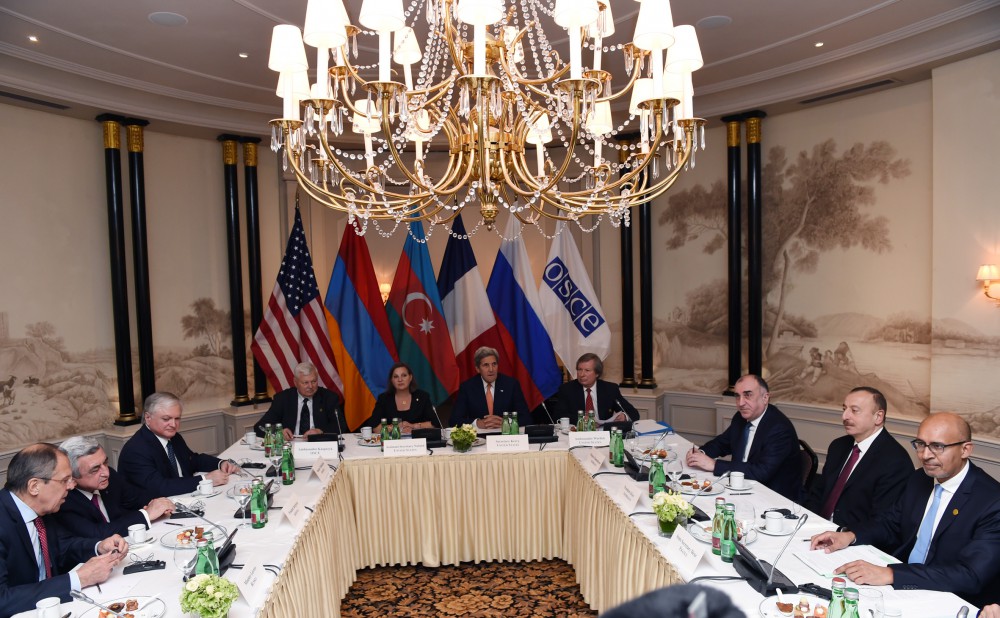Peace to come to Nagorno-Karabakh?

By Gulgiz Dadashova
The presidents of Armenia and Azerbaijan finally met in Vienna to discuss the Nagorno-Karabakh conflict, which raised hopes for peace in the region following the worst clashes in two decades.
The May 16 meeting between Azerbaijani President Ilham Aliyev and Armenian President Serzh Sargsyan become the first talk since a surge in fighting in early April that killed Azerbaijani civilians and sparked fears of a return to full-scale war.
Top diplomats from the United States, Russia and France, who are spearheading efforts to end the decades-long conflict, participated in the talks aimed at strengthening a precious ceasefire brokered by Moscow.
The meeting attended by U.S. Secretary of State John Kerry, Russian Foreign Minister Sergei Lavrov, French Minister of State for European Affairs Harlem Desir, OSCE Minsk group co-chairs, and special representative of the OSCE Chairperson-in-Office Andrzej Kasprzyk seems to make a progress, though tiny.
The presidents agreed on a next round of talks, to be held in June at a place to be mutually agreed, with an aim to resuming negotiations on a comprehensive settlement, a statement released by the OSCE following the meeting reads.
“To reduce the risk of further violence, the presidents also agreed to finalize in the shortest possible time an OSCE investigative mechanism. The presidents also agreed to the expansion of the existing Office of the Personal Representative of the OSCE Chairperson in Office. Finally, they agreed to continue the exchange of data on missing persons under the auspices of the International Committee of the Red Cross (ICRC) to which the Presidents committed during the Paris summit of October 2014."
The U.S.-initiated peace talks seem to be a new page in the conflict that reached its culmination following the war rhetoric after the April escalation. The fierce fighting on the line of contact showed that the long-standing status quo is untenable.
Before the Armenia-Azerbaijan talks, a senior U.S. official said that a deal was possible because – unlike in the case of Syria – Moscow and Washington were in agreement.
“This is a solvable conflict, there are some conflicts out there that simply have to be managed. But this is one that can be solved,” Euractiv quoted a senior U.S. as saying to reporters. “This is an issue where we see eye-to-eye with the Russians. We have no differences of opinion.”
The world powers, including the OSCE MG mediation countries realized that the longer the Nagorno-Karabakh conflict lasts, the higher is the risk of new escalation in a conflict that has already turned the South Caucasus into a hot spot.
Russia’s Lavrov, following the talks, stated that the mediators aim for the full settlement of the Nagorno-Karabakh conflict. Russian media reports that Lavrov welcomed the deal, saying: “Compromise is always possible.”
The Kremlin has also tuned to positive tone after the meeting. "There are grounds for cautious optimism after the Vienna meeting of Azerbaijani and Armenian leaders," said Dmitry Peskov, Russian president's press secretary, commenting on the meeting.
Asked about the Vienna meeting and what is the view of Kremlin “is it possible to say that the acute phase of the conflict has already passed," Peskov said: "Of course, the necessary evaluations have been given by our Foreign Minister. We want to hope that there are grounds for cautious optimism in the sense that it will allow the continuation of a sustained period. "
Azerbaijani FM Elmar Mammadyarov shared his Russian counterpart's assessment saying yesterday's meeting opens good opportunity to start the substantial talks on well-known step-by-step approach on conflict resolution.
"These talks must start as soon as possible and produce tangible results so awaited by people in the region and the international community," Mammadyarov emphasized.
While Russia has brokered a partial ceasefire on the contact line of Armenian and Azerbaijani troops and Vienna hosted the U.S.-brokered talks between the presidents of Azerbaijan and Armenia, the Armenian side continued its provocations on the frontline of troops.
In parallel with the Vienna talks to end the conflict, on the conflict zone Armenian troops breached the ceasefire and killed Azerbaijani soldier.
It seems Armenia remain loyal to its scenario of peace talks by repeating provocations after each meeting of the presidents. What is more important now is to prevent this happening again.
No serious meetings between the two presidents have been held for a very long time and the Vienna meeting can be an excellent start for ending this lingering conflict.
Azerbaijan has numerously warned that it will not tolerate the ever-lasting status quo when 20 percent of its internationally recognized territory is under occupation and over 1 million of its citizens are displaced in the their own territory. Baku wants the conflict back on the agenda of the international community, as it is frustrated over the stalled peace process and the continued occupation of territory. The Azerbaijani side wants the conflict to be solved in accordance with the international legislation.
Theretofore, the world powers need to seriously engage in the conflict resolution and warn, and even sanction Yerevan for its attempt to undermine the peace process. Such provocations are very dangerous at the current situation, as they raise the chance of a war. While the recent hostilities were de-escalated, one can take it for granted that this is always going to be the case.
--
Follow Gulgiz Dadashova on Twitter: @GulgizD
Follow us on Twitter @AzerNewsAz
